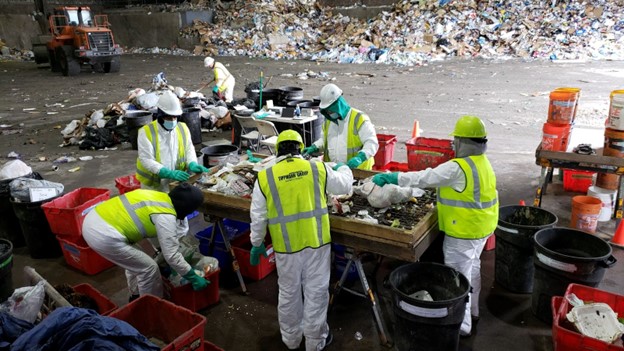
The Need: Small format packaging, i.e., packaging smaller than 2 inches in two or three dimensions, is not recyclable. For companies that have a large amount of small format in their packaging portfolio, this is a roadblock for setting and achieving recyclability goals. Small format packaging has many benefits, including proper dosing, improved shelf life, and reduced costs for stakeholders across the value chain. However, little work has been done to ensure it can be recycled at the end of its first useful life. About one-quarter of small format packaging is plastic, so our goal is to collaboratively explore solutions to make small format plastic packaging recyclable.
The Solution: The Sustainability Consortium has created a Small Format Circularity Task Force with its corporate members to conduct research and explore solutions for small format recyclability. The Task Force has commissioned two small format waste characterization studies with partners MSW and Stina Inc. and is sponsoring research at MIT.
Which of the Pact’s 4 Targets does your work help achieve?
TARGET 1: Define a list of packaging that is to be designated as problematic or unnecessary by 2021 and take measures to eliminate them by 2025
TARGET 2: 100% of plastic packaging will be reusable, recyclable, or compostable by 2025
TARGET 3: Undertake ambitious actions to effectively recycle or compost 50% of plastic packaging by 2025
What makes it particularly smart or circular? There have been no systematic studies of small format plastic packaging. The scientific and economic data we are collecting will help make the “business case” for interventions that will improve circularity.
Results, Benefits, and Outcomes to Date: Many companies have small format packaging in their portfolio, so there are continually new organizations interested in being a part of the work. We have learned that these companies see this as a collective issue that requires collaboration across industries and sectors.
How are you communicating your success? Via efforts by The Sustainability Consortium’s marketing and communications team.
What’s Next? We will publish the results of the waste characterization study and engage with MIT around researching solutions. We will also be engaging with stakeholders in the recycling industry to leverage data and insights generated through our research.
Roadblocks & Lessons Learned: Much of our effort has been to get a valid sense of what the current state of circularity is for small format packaging. It would be ideal if small format was a packaging type that was included within the standard taxonomies that we use to collect circular economy data.
Core Team, Partners, & Participants: Project participants and partners include Procter & Gamble, Burt’s Bees, Colgate-Palmolive, Haleon, Kraft- Heinz, L’Oreal, The Recycling Partnership, MSW Consultants, Stina Inc., and MIT.
Time Frame: We have been working at this since 2019 and will continue for the foreseeable future.
Quote: ”TSC’s Small Format Circularity Task Force is an exciting example of pre-competitive collaboration among CPG brands. The group has worked closely together over the last two years to pool resources, share challenges and ideas, and learn from stakeholders in other sectors to drive progress on this sustainability challenge.” – Jennifer Park, Collective Action Manager, TSC
Company/Organization Information: The Sustainability Consortium was founded in 2008 and is jointly operated by Arizona State University and the University of Arkansas. We have offices in Tempe, Arizona and Fayetteville, Arkansas, and a global staff of over 30.